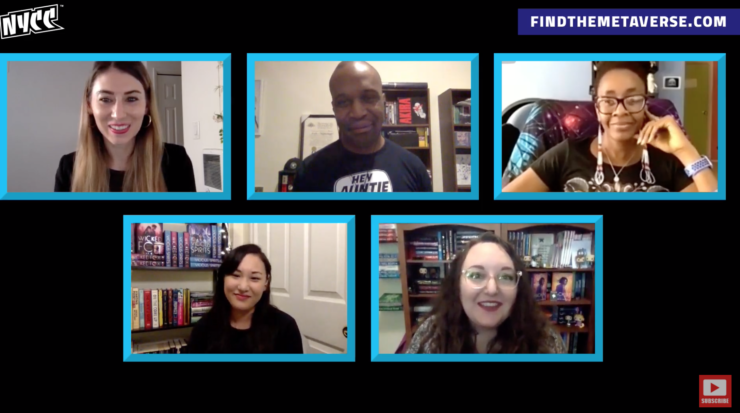A fabulous group of Penguin Teen authors came together to talk about Africanfuturism, Africanjujuism, reimagined Korean folklore, and, what else, the apocalypse! Check out this conversation between Nnedi Okorafor (Ikenga), Tochi Onyebuchi (Rebel Sisters), Kat Cho (Vicious Spirits), Lora Beth Johnson (Goddess in the Machine), and moderator and author Farrah Penn (Twelve Steps to Normal).
Watch the panel here and check out highlights below!
How do you include pieces of the real world in fantasy for young readers?
- Cho: They’re still human beings…most of the time. They still experience human emotions. I wanted to write a story that was purely Korean, so [the characters] didn’t have to explain their Koreanness.
- Johnson: It’s a conscious choice for me to put them into fantastical settings. It’s like when people say they don’t want politics in their books—the worldview that you have will find its way into your work.
- Okorafor: Most of the stories that I’m writing start with the real world…I already see the world as a magical place. Even the very first story that I wrote was supposed to be realism but other people would see it as fantasy.
- Onyebuchi: All speculative fiction is about our now. I didn’t choose speculative fiction, it chose me….I was learning to be a fiction writer from watching anime. If I’m going to talk about the Biafran War, it makes sense to do it through the lens of Gundam Wing.
What drew you to this genre?
- Cho: Animorphs, Redwall, but anime was the only place where I was able to see Asian people. They allowed Asian people to be the heroes of their own stories.
- Johnson: I grew up on Star Wars, and it was very formative for me.
- Okorafor: I grew up reading a lot, but I never looked at categories when I was in the library—what I liked I would read. I was also just an imaginative kid. SFF has always been most open to the kinds of strange stories I was writing.
- Onyebuchi: I was a pretty omnivorous reader, and I was reading everything from Robert Jordan’s Wheel of Time to Cicero. But the most formative storytelling experiences came from anime and manga. They were always incredibly morally and politically complicated stories.
One piece of writing advice?
- Cho: Your characters are very human, with relatable human emotion.
- Johnson: Read a lot and write a lot! Read a lot of fantasy, but read a lot of other genres, as well.
- Okorafor: Have fun, and play, and don’t be afraid to write the stuff that sucks! Don’t get caught up in social media validation, just enjoy yourself. You can always edit.
- Onyebuchi: I have a very unhealthy writing process, but above all else: love writing. If you can love the very act of it…that’s going to take you so so so far.










